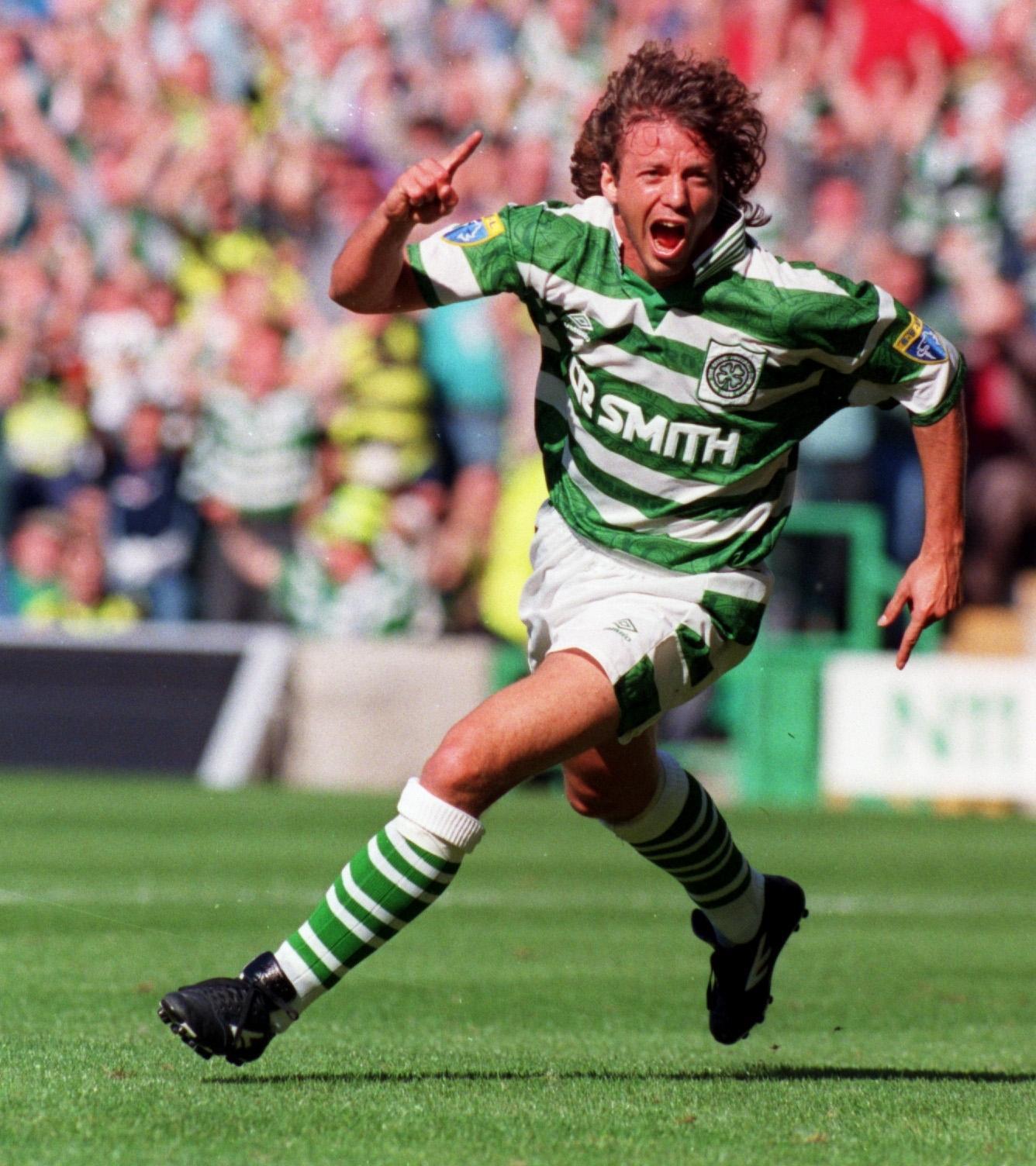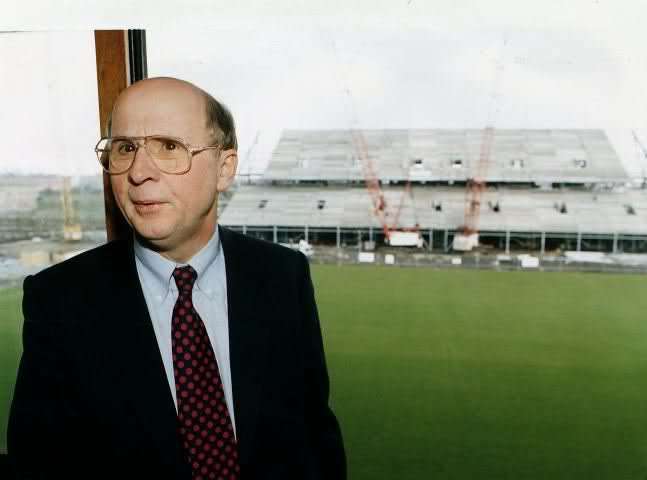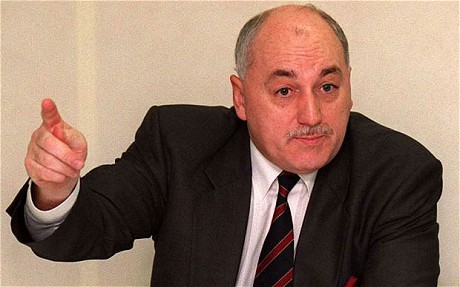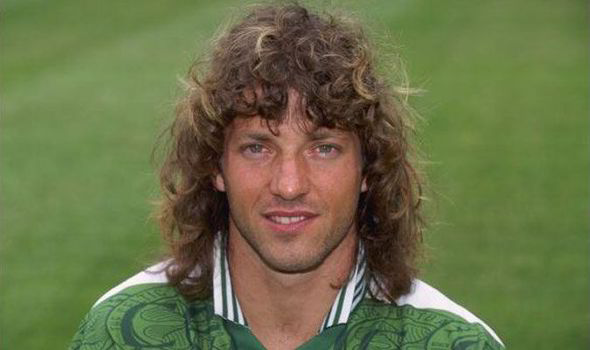On this day in 1996, Jorge Cadete finally made his Celtic debut, scoring in a 5-0 victory over Aberdeen at Paradise. However, his signing is synonymous with corruption and Jim Farry being outed as a cheat.
The mere mention of ‘the three amigos’ is enough to etch a nostalgic smile across the face of Celtic supporters of a certain age. Pierre Van Hooijdonk, Jorge Cadete and Paulo Di Canio terrorised Scottish defences in the 1996/97 season and many speculate that Scottish football history could have taken a very different course had illegal intervention not prevented Cadete from playing for the club sooner.
Celtic fans had every right to feel optimistic when the signing of Jorge Cadete was announced in February 1996. It was less than three years prior that the Portuguese striker had bagged a brace to take Sporting Lisbon to the third round of the UEFA Cup at the Bhoys’ expense. At £400,000 Cadete was a snip, his tally of 33 goals in his first full season paying testimony to that claim.
In late February 1996, Celtic submitted legitimate registration documents to the SFA and awaited international clearance for the player to officially be permitted to join the club. That clearance duly arrived on 7 March when, in keeping with FIFA rules, the Portuguese FA faxed an International Transfer Certificate to their Scottish counterparts at Hampden Park. Days later, the Portuguese FA also sent a hard copy of the original certificate in the post, as instructed by FIFA officials. All appeared in order until the SFA failed to process Cadete’s registration and in Sunday league style, the striker was not yet allowed to play.
Over the course of the next two weeks it became clear that Jim Farry of the SFA had deemed the International Transfer Certificate invalid. Although, this was only something that the Celtic board could deduce, as the SFA failed to notify the club of any problems. Concurrent to the processing of this administration, Celtic were negotiating a compensation fee with Sporting Lisbon over the transfer, which seemed to be the crux of the issue that the SFA silently held when it came to certain clauses within the transfer certification. Nevertheless, Celtic had reached an agreement with Sporting Lisbon and Jorge Cadete had also made a private settlement that he was happy with, on 23 March. Having been left in the dark by the national football authority, Fergus McCann ensured that further player registration documents were submitted to the SFA, this time incorporating a full professional application form and a new player agreement.

The unease felt by the Celtic board was soon realised when a fax was received from the SFA, explaining that the registration forms concerning Jorge Cadete had been rejected on the grounds of a disagreeable clause within the new player agreement file. This clause was present in the initial documentation, submitted on 26 February, which was of no concern to the governing body at that time. Therefore, Fergus McCann and his board members tended to feel that something underhand was going on within the offices at Hampden Park.
FIFA waded into the debate at the end of March 1996. The global organisation had their say by faxing the SFA with notification that any clauses relating to contractual agreements between Sporting Lisbon and Celtic, are not sufficient grounds upon which to deny the validity of the International Transfer Certificate. With their hand forced by FIFA, the SFA almost immediately deemed international clearance to have been granted, but further delayed the transfer by demanding that player agreement forms again be submitted, with the objectionable clause and two further clauses removed. Having been given no opportunity to contest the case, Celtic submitted a third and final set of documentation on 30 March 1996.
Jim Farry ran the rule over the paperwork once more. Importantly, it is thought that during a phone call, Farry had come to a verbal agreement with members of the Celtic secretarial team, that the registration would be listed as taking effect from 22 March. This date was crucial, as in order for Cadete to play against Rangers in the upcoming Scottish Cup Semi-Final, the Portuguese man had to have been registered by no later than 23 March.
The files hit Farry’s desk and this time there was nothing he could claim to be disagreeable. However, that didn’t mean that Cadete would simply don a Celtic shirt with immediate effect. Instead, Farry claimed no knowledge of ever reaching a verbal agreement with Celtic and saw to it that the registration would not be noted as coming into effect from 22 March. Rather iniquitously, Farry ensured that Cadete was registered with effect from 30 March 1996. Celtic had little choice but to accept the outcome because the Scottish Football League registration deadline expired on 31 March and therefore any further delays would have ruled Cadete out of all remaining league matches that season.
Upon examining Jim Farry’s historical behaviour it becomes clear that he operated in a partial manner against Celtic. He started his involvement in football as an administrative assistant at the offices of the Scottish Football Association in 1972. As an excellent administrator, Farry was quickly promoted through the ranks of the organisation, and when Willie Allan left the Scottish Football League in the late 1970s, Farry was chosen to replace him as the SFL’s youngest ever secretary. This was a position that he held for ten years.
What is peculiar about Jim Farry is that prior to his involvement in the sport, he was not a football fan. Instead, Jim Farry was a prominent member of Cambuslang Rugby Club, where he made the most of his passion with his hometown team. However, other passions of the Cambuslang man included writing, administration and reciting constitutions, laws and rules. Given this background information, it seems bizarre that three days before Dundee played Hearts in the final game of the 1985/86 league season, Farry decided to switch the referee for the match to appoint a well-known Edinburgh gentleman and Heart’s supporter (WNB Crombie) as the man in the middle. Within any other governing body this decision would have set alarm bells ringing, considering that Hearts only needed a point to assure the league title, in the event of a win for second place Celtic, against St. Mirren. The move backfired as Hoops fan, Albert Kidd, struck a double to give Dundee victory over Hearts at Dens Park. Meanwhile, Celtic scored five goals without reply to snatch the title on goal difference at Love Street.
Four years later, in 1990, the same secretarial role that Mr. Farry held with the Scottish Football League, became available at the SFA as Ernie Walker vacated the role. Jim Farry applied and was awarded the job. From this position, he went on to become Chief Executive and masterminded the Jorge Cadete registration scandal.
In total, the registration saga meant that Cadete missed out on six matches. Four of those missed games were in the Scottish Premier Division, which included two wins and two draws, whilst Cadete also missed a victorious Scottish Cup Quarter-Final, as well as the aforementioned Scottish Cup Semi-Final defeat against Rangers:
24 February – Celtic 4-0 Partick Thistle
2 March – Celtic 4-0 Heart of Midlothian
10 March Celtic 2-1 Dundee United (Scottish Cup)
17 March – Rangers 1-1 Celtic
23 March – Motherwell 0-0 Celtic
7 April – Rangers 2-1 Celtic (Scottish Cup)
Fergus McCann immediately indulged in a bitter feud with Jim Farry after being incensed at losing the cup Semi-Final against Rangers. Like many Celtic stakeholders, McCann couldn’t help but wonder what might have been if his star man was on the team sheet. The fact that Cadete scored over 30 goals the following season only reinforced this frustrating curiosity.
By January 1997, in an interview with Scotland On Sunday newspaper, Farry claimed: “Fergus McCann’s arrival in Scotland was to the detriment of the well-being of Scottish Football.” He went on to scathe of McCann further when he remarked that “There are already too many foreigners ruining our game.” Meanwhile, the Canadian Celt had already been pursuing the man at the top of the SFA through legal avenues for almost a year.

Justice was finally done in March 1999, following the investigation of an independent commission, who examined the following allegations put forward by Celtic’s majority shareholder:
On the basis of the first valid application for registration, submitted on 26th February 1996, Jorge Cadete should have been registered with effect from that date, when international clearance by way of the International Transfer Certificate was received by the SFA on 7th March.
On the basis of the second valid application form and a player agreement submitted on 23rd March 1996, Jorge Cadete should have been registered with effect from 23rd March as the SFA were in receipt of a valid set of player registration documents and the International Transfer Certificate was received on 7th March.
On submission of the third application and player agreement on 30th March, Jorge Cadete should have been registered with effect from 23rd March 1996.

McCann maintained a less than phlegmatic approach in dealing with the issue and the matter was finally settled after close to three years of legal struggle, as outlined in the following report by The Independent newspaper on 2 March 1999:
JIM FARRY’S football career is effectively at an end after the Scottish Football Association chief executive was yesterday suspended over the Jorge Cadete affair. Celtic have claimed for three years that Farry delayed the processing of the transfer of the Portuguese player in time for the Scottish Cup semi-final against Rangers in 1996. Celtic lost the game 2-1, but yesterday they won the war against the most powerful figure in the Scottish game.
The SFA has offered Celtic a written apology as well as agreeing to pay compensation and meet Celtic’s legal fees, and Fergus McCann, the Celtic chief executive, yesterday wasted little time in condemning the part played by Farry. “It has taken Celtic and its supporters three years to receive justice on the issue of the SFA’s chief executive Jim Farry’s failure to properly register Jorge Cadete.”
“It is deplorable that a prominent member club should be disadvantaged in this way when on several occasions the SFA’s chief executive had the opportunity to make the correct decision. Mr Farry’s failure to properly and timeously register Jorge Cadete leaves the club in no other position than to ask for the office bearers of the SFA to recognise that Mr Farry’s position is untenable. This case demonstrates clearly that Mr Farry cannot be allowed to hold and exercise such powerful authority.”
The issue recently went to arbitration with the SFA admitting liability before proceedings could finish. Clearly angered by the whole situation, Celtic are demanding the dismissal of Farry, who has held the top job at the SFA since 1990 following 10 years as secretary of the Scottish League.
In the last nine years he has been frequently criticised for his dictatorial attitude which at times appeared out of tune with the ordinary supporter. He insisted on Scotland playing a European Championship qualifier on the day of the funeral of Princess Diana only to back down in the face of severe pressure and criticism.
Farry’s motives for delaying the Cadete transfer remain unclear and although Celtic supporters will interpret his actions as indicating a pro-Rangers stance, McCann refused to be drawn on the topic. “I’m not claiming there was malice but there was intent. There was a failure on his part despite the advice of FIFA and Celtic. This is a matter that goes beyond Celtic Football Club, it’s a question of somebody who has failed to follow the rules of football.”
McCann intends to hold discussions with the other clubs in the Scottish Premier League and his frustration with the powerbrokers at the SFA could prove the motive towards a shift of power towards the new body who would effectively run the elite body of Scottish football. In the meantime, Farry has agreed to co-operate with an SFA investigation into his actions.

Days after the above report, on 8 March 1999, the SFA announced that Jim Farry had been sacked for gross misconduct. They brought the curtain down on the controversy with this statement:
THE Scottish Football Association advises that, following the suspension on full pay of its chief executive, Mr James Farry, the decision has been taken to dismiss Mr Farry immediately for gross misconduct.
Pending the appointment of a new chief executive/secretary, the president of the association, Mr Jack McGinn, has been appointed acting chief executive.
A detailed report from the SFA’s external lawyers was received by the Association last Thursday, March 4th. The report related to matters arising from the recent arbitration with Celtic FC, relating to the registration of Jorge Cadete.
The Emergency Committee, comprising the SFA’s office-bearers, considered the report on Friday, March 5th, and decided to request the views of the executive committee, given the policy issues involved.
The executive committee, after detailed consideration of the report and having received further legal advice, unanimously recommended that Mr Farry be dismissed from the SFA immediately.
The emergency committee effected the recommendation on Friday evening. Council was appraised today of the situation, viewed the report, and detailed discussion took place.
The reasons for Mr Farry’s dismissal result from his acts and omissions during the Cadete affair, including his conduct during:
(i) the period of the investigation of the registration by an SFA sub-committee;
(ii) the preparation of the SFA’s case for the arbitration;
(iii) his testimony during the arbitration; and
(iv) the period since his suspension on February 26th.
The SFA does not intend to make further comment on the reasons for Mr Farry’s dismissal for reasons of confidentiality.
In relation to the Cadete affair itself, approximately 110 documents were produced by the SFA and Celtic, 13 witnesses in total would have given evidence, and there had already been five days of evidence, which was scheduled to last at least a further three days with legal submissions to follow.
The SFA has made the most strenuous efforts to keep matters confidential throughout, first to comply with the rules of confidentiality in the arbitration, and thereafter in fairness to Mr Farry.
The SFA wishes to make the following comments:
(i) The SFA decided to settle the arbitration prior to the conclusion of Mr Farry’s evidence, following very strong advice and recommendations from its external legal team;
(ii) Mr Farry was immediately advised of the decision to settle and, indeed, agreed with the decision. He did not, however, agree with the terms of the letter of apology to Celtic;
(iii) Attempts were made by the SFA’s legal team to have Mr Cadete himself testify on their behalf. However, Mr Cadete refused to come to Glasgow.
In light of recent events, the SFA will, of course, undertake a thorough review of its registration procedures.
For information, the SFA processes around 47,000 player registrations per year at all levels of football, and this has been an isolated case.
It has been a very difficult period for the association and the recent events should not be allowed to cloud the work which Mr Farry has undertaken on behalf of the association and, indeed, Scottish football.
There are many positive things which can be attributed to Mr Farry over these years which should not be forgotten.




